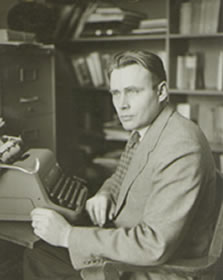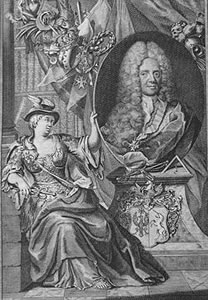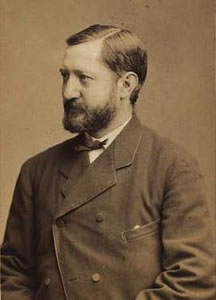De Amerikaanse schrijver Thomas Pynchon werd op 8 mei 1937 geboren in Glen Cove, Long Island, New York.
Uit: V
“Christmas Eve, 1955, Benny Profane, wearing black levis, suede jacket, sneakers and big cowboy hat, happened to pass through Norfolk, Virginia. Given to sentimental impulses, he thought he’d look in on the Sailor’s Grave, his old tin can’s tavern on East Main Street. He got there by way of the Arcade, at the East Main end of which sat an old street singer with a guitar and an empty Sterno can for donations. Out in the street a chief yeoman was trying to urinate in the gas tank of a ’54 Packard Patrician and five or six seamen apprentice were standing around giving encouragement. The old man was singing, in a fine, firm baritone:
Every night is Christmas Eve on old East Main,
Sailors and their sweethearts all agree.
Neon signs of red and green
Shine upon the friendly scene,
Welcoming you in from off the sea.
Santa’s bag is filled with all your dreams come true:
Nickel beers that sparkle like champagne,
Barmaids who all love to screw,
All of them reminding you
It’s Christmas Eve on old East Main.
“Yay chief,” yelled a seaman deuce. Profane rounded the corner. With its usual lack of warning, East Main was on him.
Since his discharge from the Navy Profane had been roadlaboring and when there wasn’t work just traveling, up and down the east coast like a yo-yo; and this had been going on for maybe a year and a half. After that long of more named pavements than he’d care to count, Profane had grown a little leery of streets, especially streets likethis. They had in fact all fused into a single abstracted Street, which come the full moon he would have nightmares about. East Main, a ghetto for Drunken Sailors nobody knew what to Do With, sprang on your nerves with all the abruptness of a normal night’s dream turning to nightmare. “

Thomas Pynchon (Glen Cove, 8 mei 1937)
Boekomslag “V”
De Ierse schrijver Roddy Doyle werd geboren in Dublin op 8 mei 1958.
Uit: A Star Called Henry
“My mother looked up at the stars. There were plenty of them up there. She lifted her hand. It swayed as she chose one. Her finger pointed.
— There”s my little Henry up there. Look it.
I looked, her other little Henry sitting beside her on the step. I looked up and hated him. She held me but she looked up at her twinkling boy. Poor me beside her, pale and red-eyed, held together by rashes and sores. A stomach crying to be filled, bare feet aching like an old, old man”s. Me, a shocking substitute for the little Henry who”d been too good for this world, the Henry God had wanted for himself. Poor me.
And poor Mother. She sat on that step and other crumbling steps and watched her other babies joining Henry. Little Gracie, Lil, Victor, another little Victor. The ones I remember. There were others, and early others sent to Limbo; they came and went before t
hey could be named. God took them all. He needed them all up there to light the night. He left her plenty, though. The ugly ones, the noisy ones, the ones He didn”t want — the ones that would never stay fed.
Poor Mother. She wasn”t much more than twenty when she gazed up at little twinkling Henry but she was already old, already decomposing, ruined beyond repair, good for some more babies, then finished.
Poor Mammy. Her own mother was a leathery old witch, but was probably less than forty. She poked me, as if to prove that I was there.
— You”re big, she said.
She was accusing me, weighing me, planning to take some of me back. Always wrapped in her black shawl, she always smelt of rotten meat and herrings — it was a sweat on her. Always with a book under the shawl, the complete works of Shakespeare or something by Tolstoy. Nash was her name but I don”t know what she called herself before she married her dead husband.“
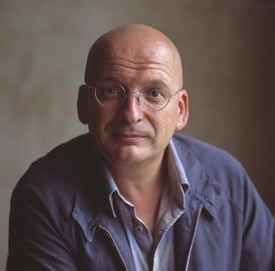
Roddy Doyle (Dublin, 8 mei 1958)
De Amerikaanse dichter Gary Snyder werd geboren op 8 mei 1930 in San Francisco.
How Poetry Comes to Me
It comes blundering over the
Boulders at night, it stays
Frightened outside the
Range of my campfire
I go to meet it at the
Edge of the light
For All
Ah to be alive
on a mid-September morn
fording a stream
barefoot, pants rolled up,
holding boots, pack on,
sunshine, ice in the shallows,
northern rockies.
Rustle and shimmer of icy creek waters
stones turn underfoot, small and hard as toes
cold nose dripping
singing inside
creek music, heart music,
smell of sun on gravel.
I pledge allegiance
I pledge allegiance to the soil
of Turtle Island,
and to the beings who thereon dwell
one ecosystem
in diversity
under the sun
With joyful interpenetration for all.

Gary Snyder (San Francisco, 8 mei 1930)
De Oostenrijkse schrijfster Gertrud Fussenegger werd geboren op 8 mei 1912 in Pilsen. Gertrud Fussenegger overleed op 19 maart van dit jaar op 96-jarige leeftijd.
Uit: Die Brüder von Lasawa
„Mit Zdenko sprach er, obwohl sie fast den ganzen Tag miteinander verbrachten, sehr wenig. Er hatte es in jener ersten Stunde, da er ihn beim Ballspiel getroffen, nicht über sich gebracht, dem Endlich-Gefundenen zu gestehen, wie lange er ihn gesucht, wie viele Wege er um seinetwillen gemacht hatte, ja, daß er nur seinetwegen, um den Bruder zu gewinnen, den Perwög-Namen ausgeschlagen, das Muttererbe fortgeworfen, die Heimat verlassen habe. Er gab auf Zdenkos Frage, wieso er hieher nach Wien gekommen sei, eine beiläufige Antwort, als hätte ihn Abenteuerei und Laune und vielleicht noch ein Auftrutzen gegen die großväterliche Herrschaft zu dieser Wanderung verführt. Auch hatte er nicht gesagt, daß er in Lasawa gewesen, und schließlich auch die Fahrt mit dem wahnsinnigen Mädchen verschwiegen. Zdenko drang auch nicht mit Fragen in ihn. Nur sein Blick ruhte oft, verstohlen forschend, auf dem jüngeren Bruder. Hie und da erkundigte er sich nach dem Handel, nach den Bräuchen der Landleute und Bürger in Tirol. Er war auf einer Fahrt einmal durch das Inntal gekommen, hatte sogar in Hall gerastet und daran gedacht, daß sein Vater hier eine zweite Frau genommen habe. “Und du bist nicht zu uns gekommen?” fragte Christof.“

Gertrud Fussenegger (8 mei 1912 – 19 maart 2009)
De Engelse schrijfster Pat Barker werd geboren in Thornaby-on-Tees op 8 mei 1943.
Uit: Another World
„Cars queue bumper to bumper, edge forward, stop, edge forward again. Resting his bare arm along the open window, Nick drums his fingers. The Bigg Market on a Friday night. Litter of chip cartons, crushed lager cans, a gang of lads with stubble heads and tattooed arms looking for trouble — and this is early, it hasn’t got going yet. Two girls stroll past, one wearing a thin, almost transparent white cotton dress. At every stride her nipples show, dark circles beneath the cloth, fish rising. One of the lads calls her name: `Julie!’ She turns, and the two of them fall into each other’s arms.
Nick watches, pretending not to.
What is love’s highest aim?
Four buttocks on a stem.
Can’t remember who said that — some poor sod made cynical by thwarted lust. Nothing wrong with the aim, as far as Nick can see — just doesn’t seem much hope of achieving it any more. And neither will these two, or not yet. The boy’s mates crowd round, grab him by the belt, haul him off her. `Jackie-no-balls
,’ the other girl jeers. The boy thrusts his pelvis forward, makes wanking movements with his fist.
Lights still red. Oh, come on. He’s going to be late, and he doesn’t want to leave Miranda waiting at the station. This is the first visit to the new house. Fran wanted to put it off, but then Barbara went into hospital and that settled it. Miranda had to come, and probably for the whole summer. Well, he was pleased, anyway.
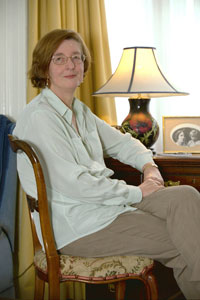
Pat Barker (Thornaby-on-Tees, op 8 mei 1943)
De Franse schrijver, vertaler regisseur en diplomaat Romain Gary werd geboren op 8 mei 1914 in Vilnius, Litouwen.
Uit: Romain Gary, le caméléon (Biografie door Myriam Anissimov)
„Une partie de la famille Owczynski était établie dans la capitale polonaise et y vivait plutôt bourgeoisement. Mina avait à Varsovie son frère, Abraham Borukh, celui qui s’appelait Boleslaw, et exerçait la profession d’avocat malgré le numerus clausus. Il avait fait ses études à la faculté de Varsovie, où les étudiants juifs se faisaient rosser par leurs condisciples chrétiens et étaient parqués sur des bancs réservés. C’est lui que Gary désigne sous le prénom de Boris, au dos de la photo datée de 1949 prise quelques mois avant sa mort.
Borukh-Abraham avait épousé à vingt-deux ans sa cousine Myriam (Maria) Owczynska, la fille de solomon Owczynski, agée de dix-sept ans, originaire de Sweciany. Les jeunes gens s’étaient unis sous la khoupa le 22 avril 1912 à Wilno devant le rabbin Rubinstein qui avait déjà marié Mina et Arieh-Leïb
(…)
L’avocat de Jean Seberg avait réussi à la convaincre qu’un procès aux Etats-Unis n’avait aucune chance d’aboutir car, selon le droit anglo-saxon, elle devait apporter la preuve au juge que la mort de sa fille avait été causée par deux lignes mensongères de l’article paru dans . Au contraire, en France, Me Cournot et le bâtonnier Paul Arrighi, les conseils de Gary et Seberg, pouvaient l’emporter en invoquant l’atteinte à la vie privée. Le 25 octobre, la XVIIe chambre correctionnelle, présidée par M. Bracquemond, rejeta leur demande d’affirmer que la mort de Nina était imputable à l’article de Newsweek, mais leur donna raison sur le second motif, ‘le viol de la vie privée’. Le magazine américain avait accusé Romain Gary de diffamation pour son article publié dans France-Soir. Il fut acquitté eu égard aux circonstances.“
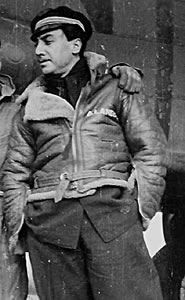
Romain Gary (9 mei 1914 – 2 december 1980)
De Amerikaanse schrijver en criticus Edmund Wilson werd geboren op 8 mei 1895 in Red Bank, New Jersey.
Uit: Edmund Wilson: A Life in Literature (Biografie door Lewis M. Dabney)
„On a brisk afternoon in September 1922, a conservatively dressed young man with red hair sat on the upper deck of a Fifth Avenue bus in Manhattan, engrossed in a manuscript. A friend at the literary magazine The Dial had put a long poem into his hands. The Dial was interested in publishing it, and the editors hoped that the young man—Edmund Wilson—would write an essay to elucidate the poem. By the time he reached Greenwich Village, Wilson had completed a first reading of T. S. Eliot’s The Waste Land. Decades later he would recall being “bowled over,” and his essay called the poem “simply one triumph after another.” This recognition of Eliot followed Wilson’s account, in The New Republic, of Joyce’s Ulysses as a masterpiece fusing naturalism and symbolism, re-creating the mind “straining always to perpetuate and perfect itself” and the body “always laboring and throbbing to throw up some beauty from its darkness.” He believed the general reader could absorb these works that challenged existing literary forms and commandeered in new ways the powers of language. Both Eliot and Joyce, he thought, occasionally tried one’s patience, but he was committed to making them more accessible.
Edmund Wilson was twenty-seven. He was fortunate to come on the scene as a critic when he did, but he had trained for this moment. At fifteen he had been sure of hisliterary vocation, and he absorbed all that liberal education had to offer both at the Hill School and at Princeton, where extraordinary teachers encouraged his curiosity and enthusiasm for books and about ideas. He emerged from his parents’ uncongenial marriage with emotional scars, but his confidence in his abilities was strong, and he was seasoned by a year as a hospital orderly in France during World War I. Though he hated the suffering he saw, he liked being on a footing of relative equality with Americans of diverse backgrounds, and returned to his country skeptical of institutions and of rank and social privilege. He joined Vanity Fair as an editorial assistant, immediately became its managing editor, and began publishing criticism there as well as in other magazines.“

Edmund Wilson (8 mei 1895 – 14 juni 1972)
Zie voor alle bovenstaande schrijvers ook mijn blog van 8 mei 2007 en ook mijn blog van 8 mei 2008 en ook mijn blog van 8 mei 2009.
De Amerikaanse schrijver Peter Benchley werd geboren in New York City op 8 mei 1940. Benchley studeerde in 1961 af aan de Harvard-universiteit, met als hoofdvak Engels. Hij is met name bekend geworden door zijn roman Jaws over een zeer gevaarlijke witte haai waar ook een eveneens bekende, gelijknamige speelfilm over is gemaakt. Later in zijn leven betreurde Benchley het dat hij witte haaien in zijn boeken als moorddadige beesten had afgeschilderd en zette hij zich in voor natuurbehoud.
Uit: Jaws
‘The boat was sinking. The stern was completely submerged, and the bow was rising.
The fish rolled off the stern and slid beneath the waves. The rope, attached to the dart Quint had stuck into the fish, followed.
Suddenly, Quint lost his footing and fell backward into the water. “The knife!” he cried, lifting his left leg above the surface, and Brody saw the rope coiled around Quint’s foot.
(….)
The fish came closer. It was only a few feet away, and Brody could see the conical snout. He screamed, an ejaculation of hopelessness, and closed his eyes, waiting for an agony he could not imagine.
Nothing happened. He opened his eyes. The fish was nearly touching him, only a foot or two away, but it had stopped. And then, as Brody watched, the steelgray body began to recede downward into the gloom. It seemed to fall away, an apparition evanescing into darkness.
Brody put his face into the water and opened his eyes. Through the stinging saltwater mist he saw the fish sink in a slow and peaceful spiral, trailing behind it the body of Quint – arms out to the sides, head thrown back, mouth open in a mute protest’

Peter Benchley (8 mei 1940 – 11 februari 2006)
Zie voor nog meer schrijvers van de 8e mei ook mijn vorige blog van vandaag.

